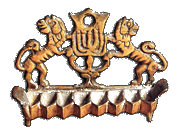Sunday, October 31, 1999
2:00 pm, LeFrak Concert Hall
"Yidl Mitn Fidl"
[Yiddle with his Fiddle]
(92 minutes; b/w; Yiddish with English subtitles; Poland,
1936)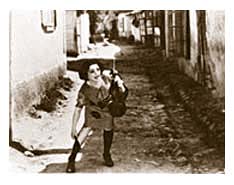
The great Yiddish actress Molly Picon cross-dresses to become Yidl, a fiddler in a band of musicians who roam the countryside in 1930s Poland. Yidl is sassy, independent, and hopelessly in love with a fellow band member, creating a series of hilarious and melodramatic situations. Location shooting in the shtetl Kazimierz, in the nearby countryside, and in Warsaw gives this film authenticity and atmosphere; we meet shtetl innkeepers, kidnapped brides on the run, big-time Warsaw producers and hear some great music. A great musical comedy, this movie combines the talents of actors Picon, Max Bozyk, and Leon Liebgold with composer Abraham Ellstein and poet Itzik Manger to become an immediate smash hit and the most commercially successful musical in the history of Yiddish cinema.
Speaker: Professor Emanuel Goldsmith
Sunday, November 21, 1999
2:00 pm, LeFrak Concert Hall
"Commissar"
(110 minutes; b/w; Russian with English subtitles; Russia,
1967) 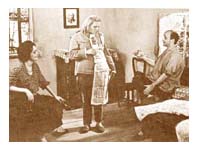
During the Russian Civil War in the 1920s, a stern, hard-boiled and pregnant Red Army Commissar is ordered to live with a poor but generous Jewish family. Amidst their warmth and compassion, she is transformed into a tender and feminine mother. But when the White Army approaches, she must choose between her commitment to the Revolution and her attachment to her child. The movie includes brilliant montage sequences, an evocative avant-garde score, and mesmerizing performances. Director Alexander Askoldov, who is not Jewish, offers a sympathetic portrait of Jews, honestly examines anti-Semitism, and makes a plea for a moral world in this masterpiece. This film was banned for almost twenty-one years in Russia before appearing finally in 1988. This film appeared in the Moscow Film Festival (1987), the Berlin Film Festival (1988), and the San Francisco International Film Festival (1988).
Speaker: Professor Stuart E. Liebman
Sunday, December 5, 1999
2:00 pm, LeFrak Concert Hall
"Pilars of Fire"
Captures the cultural richness and social complexity of a Tunisian
boy growing up.
Speaker: Dr. Janice Ovadiah
SPRING SEMESTER
Sunday, February 13, 2000
2:00 pm, LeFrak Concert Hall
"Uncle Moses"
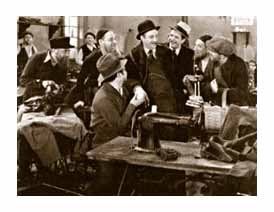 (87 minutes; b/w; Yiddish with
English subtitles; 1932)
(87 minutes; b/w; Yiddish with
English subtitles; 1932)
Based on a 1918 novel by Sholem Asch, this film features the commanding performance of Maurice Schwartz, often billed as "the greatest of all Yiddish actors," or the "Olivier of the Yiddish stage." It is just before World War I and millions of Eastern European shtetl Jews have immigrated to New York City's Lower East Side. The sweatshops in which they work and the tenements in which they live are fertile ground for romantic intrigue, struggles of the garment workers' union movement, and the clash between old-world values and new-world dreams. Schwartz is brilliant as Uncle Moses, the benevolent despot among his uprooted landsleit [fellow countrymen], whose passion for Masha, the tailor's daughter, is thwarted by circumstances beyond his control. This film is laced with pathos, comedy, great wedding sequences, a climactic strike, and surprising twists in action.
Speaker: Professor Emanuel Goldsmith
Sunday, March 5, 2000
2:00 pm, LeFrak Concert Hall
"Jacob the Liar"
(95 minutes; color; German, with English subtitles; Germany, 1974)
Jakob Heym, a Jew trapped in the Warsaw ghetto, overhears news on a Gestapo radio about a nearby Russian victory. Pretending to have heard the news on a hidden radio, Jakob passes the word on to his neighbors. Clinging to the newfound hope of deliverance, Jakob's friends anxiously ask him for regular reports of the Red Army's advance. A reluctant Jakob feels obligated to invent more uplifting news in order to provide his doomed community with the courage to endure. Adapted for the screen from a novel by Holocaust survivor Jurek Becker, this is a charming, forceful, poignant and heartwarming saga.
Speaker: Professor Stuart E. Liebman
Sunday, April 9, 2000
2:00 pm, LeFrak Concert Hall
"Kazablan"
(95 minutes; color; Hebrew, with English subtitles, 1973)
Based on a play by Yigal Mossinson, this film combines elements of the ambitious American musical with a tale of ethnic tension and romance in Old Jaffa. Nicknamed for his hometown, Kazablan is a Moroccan Jewish immigrant, a hero of an Israeli war, now living a frustrated life in the old quarter of Jaffa, where he has become the leader of a neighborhood gang involved in petty crime. As the plot unfolds, Kazablan takes time out from hassling the poverty-stricken tenants of his neighborhood to court the fair-skinned Rachel, an Ashkenazic Jew. As their cultures clash, Kazablan's passion gives way to pride when Rachel's father reveals his prejudice against the Sephardim. Punctuated by enthusiastic singing and frenetic dancing of hundreds in the cast, this fast-paced full-fledged musical, often called the Israeli West Side Story, was the first Israeli musical film spectacular and enjoyed vast popularity in Israel.
Speaker: Dr. Janice Ovadiah
About the Speakers:
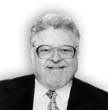
Emanuel S. Goldsmith is Professor of Yiddish and Hebrew at
Queens College, CUNY. He is the author of Modern Yiddish Culture:
The Story of the Yiddish Language Movement and of the two-volume
Anthology of Yiddish Literature in America (in Yiddish). He is
also the co-editor of Thinkers and Teachers of Modern Judaism;
The American Judaism of Mordecai M. Kaplan; Events and Movements
in Modern Judaism; and Dynamic Judaism: The Essential Writings
of Mordecai M. Kaplan. He is a member of the executive committees
of the Highlands Institute for American Religious and Philosophical
Thought and the Congress for Jewish Culture. His essays and articles
have appeared in numerous collective volumes, journals, and anthologies.
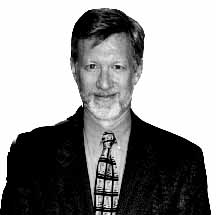
Stuart E. Liebman is Professor and Chair of the Department
of Media Studies at Queens College and the Coordinator of the
Film Studies Certificate Program at the Graduate School of CUNY.
Specializing in post-war German cinema and Soviet film history,
he has organized ten major film conferences, most recently "The
Holocaust in Cinema: Memory, Politics, and Representation."
Widely hailed as an astute film critic and scholar of film history,
Professor Liebman is author of two monographs and editor of four
special issues of scholarly journals (one issue of which won
the Association of American Publishers' Award for "Best
Single Issue of a Scholarly Journal," 1995). He has published
scores of scholarly essays and has given many scholarly and popular
lectures interpreting films and their meaning.
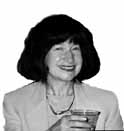 Janice Ovadiah is currently
Executive Director of Sephardic House, a national institute for
the promotion of Sephardic history and culture with a membership
of over one thousand from across the globe. Holding a doctorate
in French Literature and Cinema Studies from Columbia University,
Dr. Ovadiah has taught French and served as an interpreter for
the United States State Department. She has lectured widely on
the transformation of France's Jewish community after World War
II and on the impact the arrival of North African Sephardic Jews
had on French Jewry. Under her leadership, Sephardic House has
greatly expanded its cultural activities, educational programs,
and membership base. Dr. Ovadiah is the author of Toward a Concept
of Cinematic Literature: An Analysis of Hiroshima Mon Amour,
and other works of poetry. For seven years, she chaired the Subcommittee
on Jewish Women in the Arts of the New York UJA-Federation.
Janice Ovadiah is currently
Executive Director of Sephardic House, a national institute for
the promotion of Sephardic history and culture with a membership
of over one thousand from across the globe. Holding a doctorate
in French Literature and Cinema Studies from Columbia University,
Dr. Ovadiah has taught French and served as an interpreter for
the United States State Department. She has lectured widely on
the transformation of France's Jewish community after World War
II and on the impact the arrival of North African Sephardic Jews
had on French Jewry. Under her leadership, Sephardic House has
greatly expanded its cultural activities, educational programs,
and membership base. Dr. Ovadiah is the author of Toward a Concept
of Cinematic Literature: An Analysis of Hiroshima Mon Amour,
and other works of poetry. For seven years, she chaired the Subcommittee
on Jewish Women in the Arts of the New York UJA-Federation.
Film notes were compiled from the following sources:
J. Hoberman, Bridge of Light: Yiddish Film Between Two
Worlds
Amy Kronish, World Cinema: Israel
Janis Plotkin, Caroline Libresco, and Josh Feiger, eds.
Independent Jewish Film: A Resource Guide
For more information on this series, please call:
|
(718) 997-5730 |
Museum of Jewish Heritage |
For general information about the Center for Jewish Studies and for information about becoming a Friend of the Center, please call (718)997-5730. Please browse the Center website at: http://www.qc.edu/Jewish_Studies
For general information about the Museum of Jewish Heritage,
please call (212)509-6130. For group tour information,
call (212) 945-0039. School or youth group visits can
be arranged by calling the Museum's Education Department at
(212) 968-1800, ext. 131. Please browse the Museum
website at: http://www.mjhnyc.org

